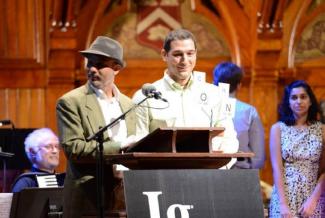
Singapore, 6 October 2015 – Assistant Professor of Finance Gennaro Bernile from the Singapore Management University’s (SMU) Lee Kong Chian School of Business (LKCSB), has won the renowned 2015 Ig Nobel Prize in the Management category. He is the only Singapore-based researcher in this year’s list of winners, and stood out for his extraordinary research on early-life disasters’ influences on CEOs’ behaviour.
The Ig Nobel Prizes honour achievements that “make people LAUGH, and then THINK”. While they celebrate the unusual and imaginative, the intention is to spur people's interest in science, medicine, and technology. With a 25-year history, 10 awards are given each year to unusual or trivial achievements in scientific research. Organised by scientific humour magazine “Annals of Improbable Research” (AIR), the prizes are presented by a group that includes genuine Nobel Laureates at a ceremony at Harvard University, which is followed by a set of public lectures by the winners at the Massachusetts Institute of Technology (MIT).
Assistant Professor Bernile’s winning research titled “What Doesn't Kill You Will Only Make You More Risk-Loving: Early-Life Disasters and CEO Behaviour” was co-authored with Assistant Professor Vineet Bhagwat (University of Oregon) and Professor P. Raghavendra Rau (University of Cambridge). According to the study, which was based on a dataset on natural disasters dating back to 1900 and cross-checked against more than 1,600 CEOs’ birthdates and birth places, CEOs who experience fatal disasters without extremely negative consequences lead firms that behave more aggressively, whereas CEOs who witness the extreme downside of disasters behave more conservatively.
These findings have potentially important and broad practical implications for c-suite executives and businesses. Intelligent risk-taking is important for growing businesses, and simulating creativity and innovation, however, a firm’s risk-taking behaviour and risk propensity is very much dependent on its Chief Executive and Board of Directors. The findings suggest that a Board of Directors should care about an individual’s risk-appetite before that person is appointed as CEO and/or when designing compensation packages, because ultimately, these could mean real economic consequences on companies’ risks and cost of capital. By the same token, investors may want to make similar considerations when deciding how to allocate their equity investments.
The research proves that it may now be worthwhile for hirers to know about potential CEOs’ childhood fatal disaster encounters. At least in part, economic decision-making and risk-taking is in fact the product of one’s past life-experiences – even those that may seem distant and potentially irrelevant.
Assistant Professor Bernile received the award at the 2015 Ig Nobel Prize ceremony on 17 September at Harvard University. Commenting on his win, he said “While the Ig Nobel Prize is known for appealing to the masses by focusing on the outrageous and humorous at the onset, which may be embarrassing at first, the scientific value of the seemingly funny or out-of-the-ordinary research sinks in soon after. After giving the informal public lecture and hearing other researchers at MIT’s renowned Huntington hall packed with eager audiences, and re-evaluating the experiences, I feel it is certainly distinguished honour and recognition to have won the Prize that lived up to its vision – of helping more people notice remarkable research in the first place, spurring them to think and understand more about the benefits and applications, and encouraging more creativity and inquisition, after some good laughs. It is infinitely better than producing research that makes people ’THINK and then LAUGH’, which is known to happen quite a bit!”
Assistant Professor Bernile has built up a broad portfolio of multi-disciplinary research that studies various aspects of corporate finance in new and rigorous ways, in line with SMU’s emphasis on generating leading-edge and multi-disciplinary research with global impact. In 2013, he was also part of a three-member team (including SMU Assistant Professors of Finance Hu Jianfeng and Tang Yuehua), who worked on a study that found ‘leaks’ in the U.S. Federal Reserve’s procedures for locking up market-moving information. Having analysed high frequency data from the late 1990s through June 2013, they found “robust evidence of informed trading” during the period when members of the news media had access to sensitive Fed monetary policy releases but before they were made public. The research was widely reported in the local and international press.
[Featured photo: Assistant Professor Gennaro Bernile (right) receiving the Ig Nobel Prize with his co-researcher Professor Raghavendra Rau (left) during the 2015 Prize Ceremony at Harvard University in September. (Credit: Improbable Research)]
- End -
Enclosures:
- Research paper “What Doesn't Kill You Will Only Make You More Risk-Loving: Early-Life Disasters and CEO Behaviour”, Gennaro Bernile, Vineet Bhagwat, and P. Raghavendra Rau, Asian Finance Association (AsianFA) 2015 Conference Paper. Accepted for publication in the Journal of Finance. http://papers.ssrn.com/sol3/papers.cfm?abstract_id=2660019
- SMU Podcast on the research insights and implications: https://www.smu.edu.sg/podcast/impact-ceos-childhood-experiences-and-board-diversity-firms-risk-taking-behaviours